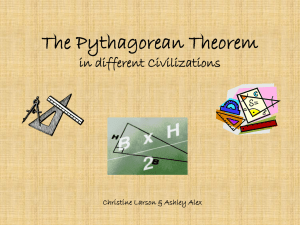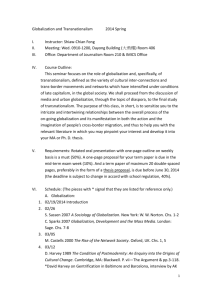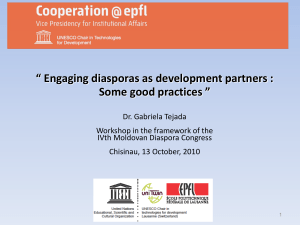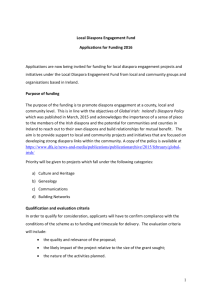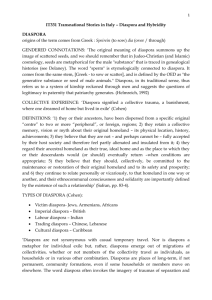Examples of thesis statements - Intr-D100G-f11-addo
advertisement
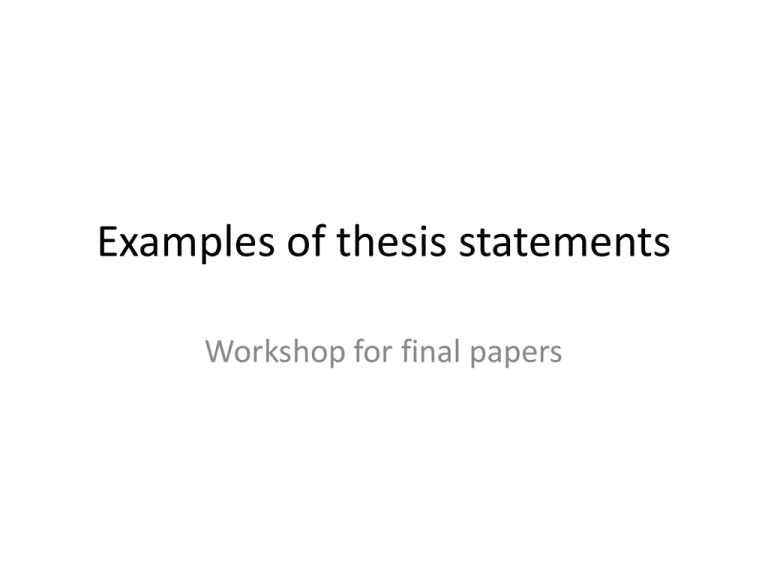
Examples of thesis statements Workshop for final papers Thesis and definition of terms are unclear • In this paper I will explore the model minority myth. I will do this by comparing and contrasting case studies about Japanese and Chinese diaspora communities in the US. I will argue that the model minority myth does not exist within the Japanese and Chinese diaspora communities. Not quite there • “Model minority refers to a minority ethnic, racial, or religious group whose members achieve a higher degree of success than the population average”. When thinking such a term, which immigrant pops into your mind? In America, there were many immigrants immigrating, and there could only be one ethnic group that was the model minority. Two ethnic groups I will be comparing are the Japanese, and Chinese diasporan communities in the US. The argument that will be followed is which of the two; Japanese and Chinese diasporians are favored among the US. Almost there • In this paper I will explore the stereotypical image Americans have by comparing and contrasting case studies about Native Americans and Asian Americans diaspora communities in the US. Films and other popular culture are major sources of stereotypes about members of these two groups. I will argue how Native Americans and Asian Americans want to be seen as “human beings” rather than just “ people” in American films, books, and also in real life. They do not want to be objects but to redeem the image of an equal American. Asians do not want to be treated as a being of knowledge but to be a normal “human being” just like everyone else. Very, very close!! • According to my knowledge, Trans-nationalism means: to go from your homeland to a host land, back and forth, for different reasons [cite a source here], and to end up including both nations as important places in your culture. To be a transnational person is to have or feel allegiance to such a community. In other words, the community does not have to be in one geographical space. Furthermore, members are not necessarily co-ethnics [cite a source]. In this paper I will explore transnationalism among the Nigerians and the Chinese in the United States. I will do this by comparing and contrasting case studies about their reasons for moving to the U.S. and I will discuss how they are maintaining allegiance to two places. I will also discuss how the host land is receiving them, especially given that, in the U.S. case, most of the Nigerians and some Chinese are Muslims. I ask: what are some difficulties they are experiencing after the 9/11? Is the result worth having a Diaspora communities in the US? I will argue that Trans-nationalism is for the most part to get a better life for them and their families even though, sometimes, it may feel like they are here because of the collective forced dispersion of people from a homeland, a definition of Diaspora taken from Challiand and Rageau (date). 1st part of the intro paragraph • According to my knowledge, Trans-nationalism means: to go from your homeland to a host land, back and forth, for different reasons [cite a source here], and to end up including both nations as important places in your culture. To be a transnational person is to have or feel allegiance to such a community. In other words, the community does not have to be in one geographical space. Furthermore, members are not necessarily co-ethnics [cite a source]. 2nd part of the Intro Paragraph • In this paper I will explore transnationalism among the Nigerians and the Chinese in the United States. I will do this by comparing and contrasting case studies about their reason for moving around and I will discuss how they are maintaining allegiance to two places. I will also discuss how the host land is receiving them, especially given that, in the U.S. case, most of the Nigerians and some Chinese are Muslims. I ask: what are some difficulties they are experiencing after the 9/11? Is the result worth having a Diaspora communities in the US? I will argue that Trans-nationalism is for the most part to get a better life for them and their families even though, sometimes, it may feel like they are here because of the collective forced dispersion of people from a homeland, a definition of Diaspora taken from Challiand and Rageau (date). Work-shopping your thesis statements – read out loud a few thesis statements good and problematic – discuss how to improve them – exchange your thesis statement with neighbor; read; discuss – does my neighbor get my point? Do I get his/her point? – Re-write your thesis statement on blank sheet of paper make it clearer; ask your neighbor – Read a few statements out loud Discuss how to improve – Go home and work on the paper, checking that your thesis and each paragraph connect (A 2. above); Include evidence to support your points in each paragraph; cite each source you use.





